Paralympics can change attitudes, says Scope Cymru head
- Published

Paralympians, such as Ellie Simmonds (pictured), will receive huge media coverage during the Paralympics
The Paralympics are a "once in a lifetime" chance to change attitudes to disabled people in the UK, says the head of a disability charity in Wales.
Ian Thomas, director of Scope Cymru, said the charity's recent survey had showed attitudes to disabled people were worsening.
He said the exposure of a home Games - billed as the biggest ever - would help change those attitudes.
The opening ceremony of the Paralympics takes place on Wednesday.
Mr Thomas told BBC Wales: "One of the things that came quite strongly out of the survey was the need for disabled people to be more visible, and I think visibility does change attitudes.
"The Paralympics will be these fantastic events [broadcast] into millions of homes all over the UK where we will see disabled people competing at the very highest level.
"This is a once in a lifetime opportunity to change these attitudes in the UK and, beyond the Games, we have got to keep a lot of the issues around disability in the public eye.
"I know for a fact that with the Games creating these celebrities [of Paralympians], that this is the chance to do it."
The Scope survey last month suggested many disabled people in Britain felt media coverage about benefit cheats had negatively affected attitudes towards them.
Almost half of the 500 disabled people and carers polled said attitudes to them had worsened.
"I think we shouldn't take away from the Games themselves," added Mr Thomas.
"This is going to be an incredible spectacle, [with] amazing athletes, endurance, and you will see fantastic performances."
Welsh former Paralympian John Harris said the Games would help the public feel more comfortable with disabilities.
"What we're doing, we're bringing to the fore people with disabilities. Very often, a lot of people don't see people with disabilities, only from a distance," he said.
"We're bringing them into people's homes.
"We're turning a lot of disabled people into celebrities, for want of a better word, which is fine by me because people feel far more comfortable with that and they will feel far more comfortable with a disability."
- Published28 August 2012

- Published31 July 2012

- Published31 July 2012

- Published15 February 2015
